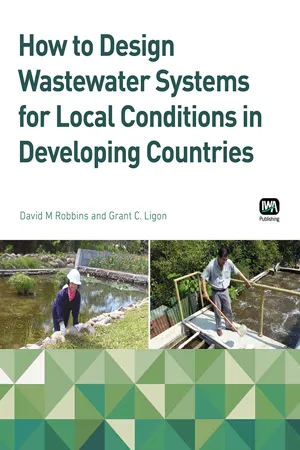
eBook - PDF
How to Design Wastewater Systems for Local Conditions in Developing Countries
- 156 pages
- English
- PDF
- Available on iOS & Android
eBook - PDF
How to Design Wastewater Systems for Local Conditions in Developing Countries
About this book
This is a practical handbook providing a step-by-step approach to the techniques used for characterizing wastewater sources and investigating sites where collection, treatment and reuse/disposal technologies will be installed. It is intended to help enable local implementation of on-site and decentralized wastewater management system (DWMS)for wide scale use in development settings.
How to Design Wastewater Systems for Local Conditions in Developing Countries helps local service providers and regulatory officials make informed decisions through the use of tools, checklists and case studies. It includes a link to a web based community of on-site and decentralized wastewater professionals, which contains related tools and case studies. This handbook serves as a reference for training classes, certification programs, and higher education programs in civil and sanitary engineering. There is an increasing interest on the part of local government officials and private sector service providers to implement wastewater treatment systems to solve sanitation problems. The model presented in this handbook promotes activities that first generate data related to source and site conditions that represent critical inputs, and then applies this information to the technology selection process. Matching the most appropriate technologies to the specific needs of the wastewater project is the key that leads to long term sustainability.
How to Design Wastewater Systems for Local Conditions in Developing Countries is an invaluable resource for public sector decision makers and private sector service providers in developing countries. It is also a useful text for students at engineering colleges in developing countries interested in taking a class that teaches the methods of decentralized wastewater management system (DWMS) development.
Frequently asked questions
Yes, you can cancel anytime from the Subscription tab in your account settings on the Perlego website. Your subscription will stay active until the end of your current billing period. Learn how to cancel your subscription.
No, books cannot be downloaded as external files, such as PDFs, for use outside of Perlego. However, you can download books within the Perlego app for offline reading on mobile or tablet. Learn more here.
Perlego offers two plans: Essential and Complete
- Essential is ideal for learners and professionals who enjoy exploring a wide range of subjects. Access the Essential Library with 800,000+ trusted titles and best-sellers across business, personal growth, and the humanities. Includes unlimited reading time and Standard Read Aloud voice.
- Complete: Perfect for advanced learners and researchers needing full, unrestricted access. Unlock 1.4M+ books across hundreds of subjects, including academic and specialized titles. The Complete Plan also includes advanced features like Premium Read Aloud and Research Assistant.
We are an online textbook subscription service, where you can get access to an entire online library for less than the price of a single book per month. With over 1 million books across 1000+ topics, we’ve got you covered! Learn more here.
Look out for the read-aloud symbol on your next book to see if you can listen to it. The read-aloud tool reads text aloud for you, highlighting the text as it is being read. You can pause it, speed it up and slow it down. Learn more here.
Yes! You can use the Perlego app on both iOS or Android devices to read anytime, anywhere — even offline. Perfect for commutes or when you’re on the go.
Please note we cannot support devices running on iOS 13 and Android 7 or earlier. Learn more about using the app.
Please note we cannot support devices running on iOS 13 and Android 7 or earlier. Learn more about using the app.
Yes, you can access How to Design Wastewater Systems for Local Conditions in Developing Countries by David M. Robbins,Grant C. Ligon in PDF and/or ePUB format, as well as other popular books in Technology & Engineering & Environmental Science. We have over one million books available in our catalogue for you to explore.
Information
Table of contents
- Cover
- Contents
- Dedication
- Acknowledgements
- Foreword
- Quick guide – New project checklist
- Chapter 1: Introduction to decentralized wastewater management systems
- Chapter 2: Characterizing the source
- Chapter 3: Evaluating the site
- Chapter 4: DWMS technologies
- Chapter 5: Selecting wastewater technologies
- Appendices Practical application of soils evaluation data